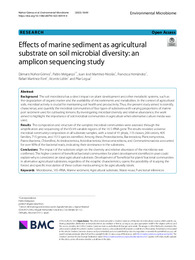Título :
Effects of marine sediment as agricultural substrate on soil microbial diversity: an amplicon sequencing study |
Autor :
Núñez-Gómez, Dámaris
Melgarejo Moreno, Pablo 
Martinez Nicolas, Juan Jose 
Hernández, Francisca
Martínez Font, Rafael
Lidón Noguera, Vicente 
Legua, Pilar  |
Editor :
BMC |
Departamento:
Departamentos de la UMH::Producción Vegetal y Microbiología |
Fecha de publicación:
2023-08 |
URI :
https://hdl.handle.net/11000/32368 |
Resumen :
Background The soil microbiota has a direct impact on plant development and other metabolic systems, such as the degradation of organic matter and the availability of microelements and metabolites. In the context of agricultural soils, microbial activity is crucial for maintaining soil health and productivity. Thus, the present study aimed to identify, characterize, and quantify the microbial communities of four types of substrates with varying proportions of marine port sediment used for cultivating lemons. By investigating microbial diversity and relative abundance, the work aimed to highlight the importance of soil microbial communities in agriculture when alternative culture media was used.
Results The composition and structure of the sampled microbial communities were assessed through the amplification and sequencing of the V3-V4 variable regions of the 16 S rRNA gene The results revealed a diverse microbial community composition in all substrate samples, with a total of 41 phyla, 113 classes, 266 orders, 405 families, 715 genera, and 1513 species identified. Among these, Proteobacteria, Bacteroidota, Planctomycetota, Patescibacteria, Chloroflexi, Actinobacteriota, Acidobacteriota, Verrucomicrobiota, and Gemmatimonadota accounted for over 90% of the bacterial reads, indicating their dominance in the substrates.
Conclusions The impact of the substrate origin on the diversity and relative abundace of the microbiota was confirmed. The higher content of beneficial bacterial communities for plant development identified in peat could explain why is considered an ideal agricultural substrate. Development of “beneficial for plants” bacterial communities in alternative agricultural substrates, regardless of the edaphic characteristics, opens the possibility of studying the forced and specific inoculation of these culture media aiming to be agriculturally ideals.
|
Palabras clave/Materias:
Microbiome
16S rRNA
Marine sediment
Agricultural substrate
Waste reuse
Functional inferences |
Área de conocimiento :
CDU: Ciencias aplicadas: Agricultura. Silvicultura. Zootecnia. Caza. Pesca |
Tipo de documento :
info:eu-repo/semantics/article |
Derechos de acceso:
info:eu-repo/semantics/openAccess |
DOI :
https://doi.org/10.1186/s40793-023-00519-4 |
Publicado en:
Environmental Microbiome volume 18, Article number: 69 (2023) |
Aparece en las colecciones:
Artículos - Producción vegetal y microbiología
|
 La licencia se describe como: Atribución-NonComercial-NoDerivada 4.0 Internacional.
La licencia se describe como: Atribución-NonComercial-NoDerivada 4.0 Internacional.
.png)
